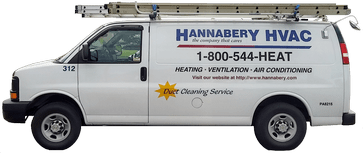Commonly Reported HVAC Problems:
Copyright © 1997 Hannabery HVAC. All rights reserved.
Heat pump or Air Conditioner iced-up in Summer:

It is never normal to see ice during the summer anywhere on the inside or outside of a heat pump or a central air conditioner. This includes the indoor unit, outdoor unit and interconnecting line-set. It is possible to ice-up the indoor coil however, if the air conditioner is running in very cold weather or if the thermostat is turned down extremely low.

We recommend never turning the thermostat below 70 degrees when running your air conditioning. This could potentially cause your indoor coil to frost or even freeze up, and/or possibly cause your ductwork to sweat, which could lead to water or mold damage in your walls or ceilings. If air conditioning is needed during winter months, such as for restaurants or businesses, then a "Low ambient kit" is required, and can be installed by a service technician.

If you see ice anywhere on a heat pump or air conditioner during the summer, then there is most likely a problem and you should turn it off immediately.
Below is a list of possible causes. Items in red usually require a service call. Items in blue however can be addressed, some even fixed by the homeowner.
- Bad indoor fan motor- not running/running slow
- Loose, worn, or broken fan belt
- Bad indoor fan relay
- Extremely dirty blower wheel
- Low refrigerant charge
- Restriction
- Blocked capillary tube
- Blocked orifice
- Faulty expansion valve
- Stuck compressor contactor
- Faulty thermostat
- Extremely dirty or damaged indoor coil
- Clogged or blocked air filter
- Supply and/or Return vents blocked or closed
- Running air conditioner with windows open
- Setting thermostat too low
One other thing to keep in mind: If you have a central humidifier, make sure it is shut off and if it has a damper - close it for the summer.
Please keep in mind that the information found on our website is provided free of charge and Hannabery HVAC does not assume any liability resulting from the information we provide. We hope this information helps, but please note that these are just rough guidelines, and not all possible situations are covered. Your HVAC system should be inspected and repaired by a trained technician.
How Comfortable Do You Want To Be?
[Must be in our service area]

